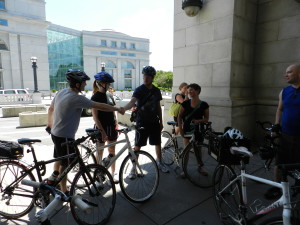As part of a community-based learning project, I partnered with the Washington Area Bicycling Association to conduct a study on the perceived barriers to mobility among low income residents in Washington DC’s Wards 7 and 8.
We published a synopsis of our initial findings in The Atlantic Cities’ CityLab blog. It was well received; 8,000 shares in the first week! Subsequent interviews about the work, like this one on Huffington Post, also generated quite a buzz.
I am writing up the findings in a scholarly journal article with Adam Jadhav, my co-author and talented former grad student. We suggest several key policy implications for planners and political leaders in the article, based on our research.
Key findings of our study: Low-income commuters spend around 4 hours longer per week in Washington DC getting to and from their places of work. There are over 30 reasons people cited for why they did not want to ride bicycles, and despite knowing the higher costs of cars, respondents still tended to prefer car ownership and to voice a lack of desire for a car-free lifestyle. Creating physical infrastructure for cycling alone is not an adequate response towards getting more people on bicycles; we need to better understand and anticipate what the needs are of low-income commuters before assuming that they will want to ride bicycles just because bicycles tend to be affordable and healthy.
Students in my Fall 2012 Urban Development course, and subsequently in my Spring 2013 Environment & Development course designed and deployed a survey about the issue, using both qualitative data from open-ended questions and quantitative data from other survey questions.
Related News Coverage:
Why Cycling’s Largest Demographic is Invisible on HuffPost Live, November 2, 2015.
Nope, Hipsters Aren’t the Only Ones who Ride Bikes Huffington Post, November 4, 2015.
The League of American Bicyclists posted a blog entry on bike share equity and local issues, where the research was also discussed.